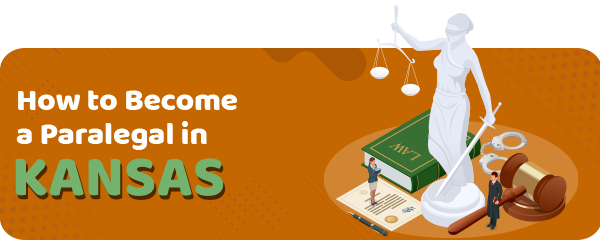You don’t have to finish law school to work in an attorney’s office.
Learn how to become a Paralegal in Kansas, which could only take you about two years.
Article Table of Contents
Licensing Requirements to Become a Paralegal in Kansas
Students interested in becoming paralegals should go to the Kansas Bar Association website.
That is where you can find information about what exam to take, ethical issues, and more.
See also the National Association of Legal Assistants.
That’s who sponsors the Certified Paralegal Examination you would take to become a CP (Certified Paralegal) or CLA (Certified Legal Assistant).
After achieving the CP or CLA, you can then work toward the Advanced Certified Paralegal (ACP) credential.
To obtain this certificate, you would need to pass the Advanced Paralegal Examination.
5 Paralegal Schools in Kansas
1. Hutchinson Community College (HutchCC)
A person who takes the Associate Degree Paralegal training at HutchCC prepares for work in a law firm.
Students who pass their NALA exam can also work in other settings, such as a federal, state, or local government building.
In addition, students have an opportunity to concentrate on real estate or insurance law if they want.
They become ready to carry out all duties assigned to them by the lawyers in charge too.
Paralegals often appear in court, paying attention to the case and taking notes for an attorney.
That is one more aspect of training you will learn at HutchCC.
2. Johnson County Community College (JCCC)
JCCC offers a Paralegal Certificate for people who already have an associate degree or higher credential.
This school also provides the Associate of Arts with an Emphasis in Paralegal if you want to earn a degree.
This instruction has received approval from the American Bar Association (ABA).
During your schooling here, you will practice in the real world what you learn in classes.
In addition, you will prepare for responsibilities, such as drafting legal documents, investigating cases, and conducting legal research.
Even though your JCCC training won’t make you a lawyer, it does immerse you in the legal department.
This training could also set you on your way to going to law school later if that is what you want to do.
By the way, the associate program would take you about two years.
The certificate program would take you about one year.
3. Kansas City Kansas Community College (KCKCC)
KCKCC provides an extensive Associate of Applied Science Paralegal offering.
This training will equip you with the knowledge you need to perform as an expert in a corporate legal department or government building.
Your KCKCC coursework will also prepare you for work in a private law firm.
Some general studies, such as math, humanities, or psychology courses are required.
You also receive an introduction to different types of law, such as criminal, probate, or insurance legislation.
You won’t be able to give legal advice, at least not in most situations.
However, you will serve a strong supporting role for any lawyer who would be lucky to have you working for them.
Your training will also teach you ways to research cases and includes bookkeeping and database software training.
4. University of Kansas (KU)
KU provides you with public administration, law, and society degree training and minors of your choice.
You will more than likely complete your coursework at the KU Edwards campus.
Here, you can earn an associate’s or bachelor’s degree with a major in Law and Society.
Otherwise, you can minor in this subject if you want.
Besides becoming a paralegal, it can broaden your knowledge if you desire to work as a research analyst.
Other careers your KU Edwards training can prepare you for include law enforcement or probation officer, social worker, and non-profit administrator.
You will still have to contact the Kansas Bar Association to make sure your classes prepare you for your Paralegal Exam. Still, this training is an excellent start and can enhance a current credential.
5. Washburn University
Washburn offers the Bachelor of Legal Studies program.
You can use it as standalone training for work as a paralegal, legal assistant, or similar role.
This schooling also prepares you for entry into law school if that is what your desire is.
You will receive practical and classroom training.
Subjects taught include ethics compliance, statutory law interpretation, legal note taking and proper research citations, and critical thinking.
You will also learn how the legal system itself works.
Paralegal Schools in Kansas – Summary Table
| School Name | Address |
|---|---|
| Hutchinson Community College | 1300 N Plum St, Hutchinson, KS 67501 |
| Johnson County Community College | 12345 College Blvd, Overland Park, KS 66210 |
| Kansas City Kansas Community College | 7250 State Ave, Kansas City, KS 66112 |
| University of Kansas | 1450 Jayhawk Blvd, Lawrence, KS 66045 |
| Washburn University | 1700 SW College Ave, Topeka, KS 66621 |
Salary
Paralegals in Kansas make an average yearly income of $57,080.
Your salary would range from $50,481-$64,449, depending on your work location.
If you continue to add to your credentials, you could earn more than $71,157 per year.
Cities where you can find paralegal jobs include Kansas City, Overland Park, Dodge City, and Topeka.
Check locations nearest you too.
Annual Salary Range:| Location | Avg. Annual Salary |
|---|---|
| Wichita | $57,922 |
| Overland Park | $58,837 |
| Kansas City | $59,047 |
| Topeka | $56,232 |
| Olathe | $58,677 |
| Lawrence | $57,124 |
| Shawnee | $58,837 |
| Salina | $57,321 |
| Manhattan | $55,631 |
| Hutchinson | $57,321 |
Regional Salary in Kansas
| Region | Employed | Avg. Annual Salary | Avg. Hourly Pay | Top 10% Annual Salary | Bottom 10% Annual Salary |
|---|---|---|---|---|---|
| Lawrence, KS | 100 | $48,910 | $23.51 | $64,430 | $36,020 |
| Manhattan, KS | 50 | $50,360 | $24.21 | $75,020 | $35,630 |
| Topeka, KS | 310 | $49,030 | $23.57 | $67,580 | $35,990 |
| Wichita, KS | 750 | $47,920 | $23.04 | $65,970 | $33,410 |
* Employment conditions in your area may vary.
Frequently Asked Questions
What is a paralegal?
A paralegal is someone who works for a lawyer upon receiving the appropriate legal training.
They usually review cases to the best of their knowledge and perform law office duties.
Are a paralegal and a legal assistant the same thing?
Paralegals and legal assistants have similar training, so both terms are used interchangeably.
However, not everyone at the same certification level works under one of these job titles.
What cannot a paralegal do?
They cannot accept cases or give legal advice.
Paralegals also cannot set client fees or represent a client in court.
Where does a paralegal usually work?
Many of them work in a law office, whether it be for a single attorney or multiple law partners.
Alternatively, some persons employed as a paralegal may work for a government agency or corporation.
What does a paralegal do all day?
They keep data collected for cases organized.
For this, they must know how to use the computer software required for this position.
In addition, paralegals may contact clients, witnesses, outside vendors, and other lawyers related to a case.
In addition, they schedule meetings, interviews, and depositions.
They also must pay close attention to cases and take notes during them.
In addition, they keep all affidavits admissible to court in safekeeping and draft contracts, mortgages, and other legal papers.
Go to the Bureau of Labor Statistics website to learn more about the job responsibilities of a legal assistant.
Read the full guide: How to Become a Paralegal




I can’t believe the annual salary of a Paralegal here in Kansas is that good. I’m about to pursue this career once I graduate and I hope I can do it and become a lawyer someday.
On point! Gathering all the data for a case is one of my favorites, I am on my way to getting my licensure in Kansas. They said the city needs more Paralegal staff there, especially this year.
Washburn University seems pretty great, I will try to know their requirements first since I have a cousin who is taking Paralegal there. Nice post!
I have my top 3 schools in Kansas and I am having a hard time picking the best one. But I think I will apply to the schools that are stated above and see the tuition difference.